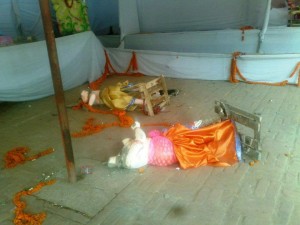
(A Representative Image)
DHAKA: Islamic activists have attacked dozens of Hindu temples and hundreds of homes across Bangladesh since an Islamist leader was sentenced to death for war crimes last month, a Hindu group said Wednesday.

Bangladesh Puja Udjapon Parishad, a group which looks after Hindu temples, said 47 temples and at least 700 Hindu houses had either been torched or vandalised since the verdict against Delwar Hossain Sayedee.
Sayedee, vice-president of the country’s largest Islamic party Jamaat-e-Islami, was sentenced to hang on February 28 for crimes including rape and murder committed during the 1971 independence conflict.
The sentencing of Sayedee and other Jamaat-e-Islami leaders has triggered the worst violence in impoverished Muslim-majority Bangladesh since independence, with 85 people so far killed in the unrest.
Kazal Debnath, a vice-president of Bangladesh Puja Udjapon Parishad, blamed the attacks on Hindu temples and homes on Jamaat-e-Islami and its student wing Islami Chhatra Shibir.
“It was the work of the Jamaat and Shibir, but we also accuse the government, the police and the local government representatives including (our) MPs for failing to protect the temples and our community,” he told AFP.
He said the attackers were given free rein to “torch our temples, houses and properties”.
Jamaat has denied any role in the attacks, blaming supporters of the ruling Awami League party for the violence.
But Foreign Minister Dipu Moni told diplomats last week that Jamaat and Shibir attacked Hindu temples and houses in a “pre-planned manner”.
Hindus, who make up nearly 10 percent of Bangladesh’s 153 million-strong
population, are traditionally seen as supporters of the Awami League, which brands itself as a secular party.
They were the main targets during Bangladesh’s 1971 independence war against Pakistan and during post-poll violence in 2001 when a centre-right party allied with Jamaat won a two-thirds majority.
Jamaat-e-Islami leaders have been on trial at the domestic International Crimes Tribunal, accused of colluding with Pakistan and pro-Pakistan militias during the war for independence.
But the party says the process is an attempt by the ruling party to settle scores and not about delivering justice.





